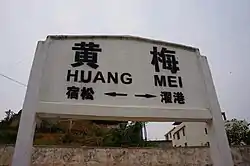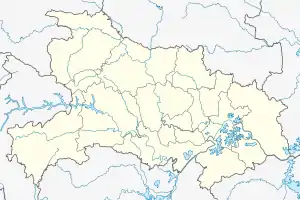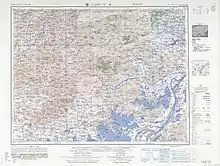Huangmei County
Huangmei County (simplified Chinese: 黄梅县; traditional Chinese: 黃梅縣; pinyin: Huángméi Xiàn) falls under the administration of Huanggang City in eastern Hubei province, People's Republic of China, and borders Anhui to the east and Jiangxi to the south across the Yangtze. It also administers Shanjia Islet (单家洲) in the Yangzte.
Huangmei County
黄梅县 Hwangmei | |
|---|---|
 Huangmei Station | |
 Huangmei Location of the seat in Hubei | |
| Coordinates (Huangmei government): 30°04′14″N 115°56′39″E | |
| Country | People's Republic of China |
| Province | Hubei |
| Prefecture-level city | Huanggang |
| Time zone | UTC+8 (China Standard) |
| Website | 黄梅县人民政府门户网站 (Huangmei County People's Government Web Portal) (in Simplified Chinese) |
Geography

Administrative divisions
Huangmei County administers:[1][2][3]
| # | Name | Chinese (S) | ||||
|---|---|---|---|---|---|---|
| Towns | ||||||
| 1 | Huangmei | 黄梅镇 | ||||
| 2 | Konglong | 孔垄镇/孔垅镇 | ||||
| 3 | Xiaochi | 小池镇 | ||||
| 4 | Zhuogang | 濯港镇 | ||||
| 5 | Xinkai | 新开镇 | ||||
| 6 | Caishan | 蔡山镇 | ||||
| 7 | Wuzu | 五祖镇 | ||||
| 8 | Tingqian | 停前镇 | ||||
| 9 | Xiaxin | 下新镇 | ||||
| 10 | Dahe | 大河镇 | ||||
| 11 | Fenlu | 分路镇 | ||||
| 12 | Dushan | 独山镇 | ||||
| Townships | ||||||
| 13 | Shamu | 杉木乡 | ||||
| 14 | Liulin | 柳林乡 | ||||
| 15 | Kuzhu | 苦竹乡 | ||||
| 16 | Liuzuo | 刘佐乡 | ||||
| Other Area | ||||||
| 17 | Longgan Lake Farm | 龙感湖农场 | ||||
As of 2013, the county jurisdiction over 12 towns, 4 townships, which are Huangmei town, Koike town, KONGLONG town, under the new town, big town, stopped before the town, Wuzu town, town Zhuo, Cai Town, the new open town, town alone, shunt town, fir Township, Liulin Township, Nigatake Township, township and Liu Zuo Nuebu Park management Office, management Office Longganghu.
History
In 845 BC Marquis Wen 文侯 Huang Meng 黃孟 (aka Huang Zhang 黃璋) moved the capital of the State of Huang from Yicheng to Huangchuan (present-day Huangchuan, Henan). Huang Xi's descendants ruled State of Huang until 648 BC when it was destroyed by the State of Chu. The Marquis of Huang, Marquis Mu 穆侯 Huang Qisheng 黃企生, fled to the state of Qi. The people of Huang were forced to relocate to Chu. They settled in the region of present-day Hubei province, in a region known as the Jiangxia Prefecture 江夏郡 during the Han dynasty (206 BC-AD 220). There are many places in this region today that were named after Huang e.g. Huanggang, Huangpi, Huangmei, Huangshi, Huangan, Huangzhou etc. A large number of the people of Huang were also relocated to regions south of the Yangtze River.
Huangmei opera
Huangmei is famous for its tea and tea-picking songs, which evolved into Huangmei opera (Chinese: 黃梅戲 / 黃梅調;; pinyin: Huángméixì / Huángméidiào). The opera was derived from caicha (tea-picking — cha means tea) tunes and folk ditties which people sang while picking tea. It is a combination of local folk songs, dances, and some ancient operas. Huangmei opera flourished in the 18th century to become one of the most famous traditional Chinese opera forms.
Transport
Huangmei is connected to Jiujiang by two bridges across the Yangtze River.
References
- 黄梅简介 (in Chinese). Huangmei County People's Government. Retrieved 12 January 2018.
现设黄梅、孔垅、小池、濯港、新开、蔡山、五祖、停前、下新、大河、分路、独山12个镇,杉木、柳林、苦竹、刘佐4个乡
- 黄冈市乡镇(街道)名录 [Huanggang City Township-level Divisions List] (in Chinese). XZQH.org. 15 August 2014. Retrieved 12 January 2018.
黄梅县辖12个镇、4个乡:黄梅镇、孔垄镇、小池镇、下新镇、大河镇、停前镇、五祖镇、濯港镇、蔡山镇、新开镇、独山镇、分路镇、柳林乡、杉木乡、苦竹乡、刘佐乡。
- 中国地质邮政编码簿(2015). 中国邮政集团公司. 2015. p. 595.